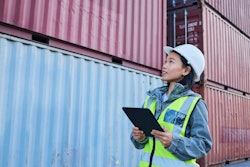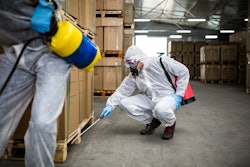
In the realm of food logistics, the security of cargo against theft is of paramount importance. Ensuring the safe and timely delivery of food products from farm to fork is not only a logistical challenge but also a matter of public health and safety. However, the traditional methods used to protect shipments, such as padlocks, electronic seals, and manual control towers are no longer sufficient in today's dynamic food logistics industry. These outdated techniques often result in a lack of timely insights into breaches, wasted time and resources chasing false alarms, and increased insurance premiums. The urgency to reduce cargo theft and its associated problems in the food logistics sector calls for innovative solutions.
The escalating sophistication of cargo thieves, coupled with the intricacies of the global food supply chain, has elevated the importance of security measures. Traditional approaches, which often rely on mechanical and manual interventions, struggle to keep pace with the evolving strategies of criminals. Cargo theft has evolved into a dynamic and technologically driven threat, making it imperative for food logistics companies to embrace advanced technology to safeguard their supply chains effectively.
As a result, companies must adapt and embrace advanced technology to safeguard their supply chains effectively. In this rapidly changing landscape, artificial intelligence (AI) technology emerges as a crucial ally in the battle against cargo theft. Here are three critical aspects to mitigate the risk of cargo theft and improve food logistics.
1. Enhanced visibility
One of the primary shortcomings of traditional cargo security methods is the lack of comprehensive visibility. A modern AI approach addresses this issue by combining order information with real-time location, condition, and security data from Internet of Things (IoT) sensors and smart locks. This data can be complemented by information from various sources, including port operations, vessels, rail operations, freight forwarders, and carrier data aggregation platforms.
2. Real-time alerts and signals
Implementing AI into the supply chain goes beyond mere data collection by providing real-time alerts and signals. These alerts can be derived from verifiable visibility, empowering companies to take immediate action in response to security breaches. For example, unauthorized container door openings or deviations from planned routes trigger security breach alerts. This level of proactive monitoring and response ensures that security threats are addressed promptly, reducing the risk of cargo theft.
An illustrative case of an AI implementation is exemplified by food and beverage companies facing the daunting challenge of cargo theft. This pivotal situation demands a comprehensive solution that would not only safeguard cargo but also elevated supply chain security to unprecedented levels.
However, the true game-changer lies in the real-time data and analytics. This stream of information allows companies to make informed decisions and accurate estimations regarding the arrival times of shipments at distribution centers.
The integration of AI-powered wireless sensors and the proactive vigilance of the control tower team turns supply chains into an impervious fortress against theft and tampering.
3. Intelligence and AI-powered insights
The power of AI comes to the forefront in this modern cargo security approach. AI-driven network insights and foresights offer companies the ability to plan and execute their supply chain operations more effectively. By scoring security risk performance by lane, carrier, port, and node, businesses can identify potential vulnerabilities and take preemptive measures. Predictive analytics play a crucial role in forecasting key performance indicators, allowing companies to proactively manage their supply chain security.
One major food retailer implemented a predictive analytics solution, which resulted in a 30% reduction in food waste, a critical achievement in the food logistics sector where preserving the quality and safety of products is paramount. Additionally, on-time deliveries improved by 20%, ensuring that food products reached their destinations as planned, contributing to customer satisfaction and efficient supply chain management.
Empowering food logistics: A safer tomorrow
Cargo theft poses substantial challenges to the food logistics industry, impacting not only financial resources but also brand reputation and, most importantly, public health and safety. In response to these challenges, a modern cargo security approach has emerged, incorporating artificial intelligence and offering a comprehensive solution to safeguard valuable shipments throughout the supply chain. Through real-world success stories and the integration of AI technology, the food logistics sector can revolutionize supply chain management, reduce cargo theft, and ensure the safe and efficient delivery of food products. As rising transport costs, unpredictable markets, complex supply chains, and changing regulations are predicted to impact the evolution of the food logistics industry, adopting advanced AI solutions with a trusted partner becomes essential to maintain the security and integrity of the global food supply chain.


















